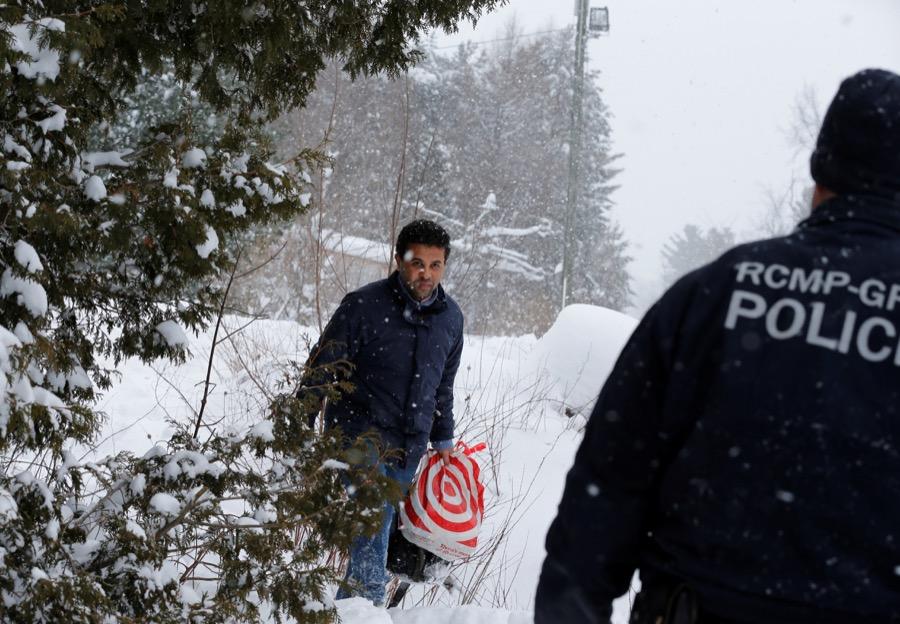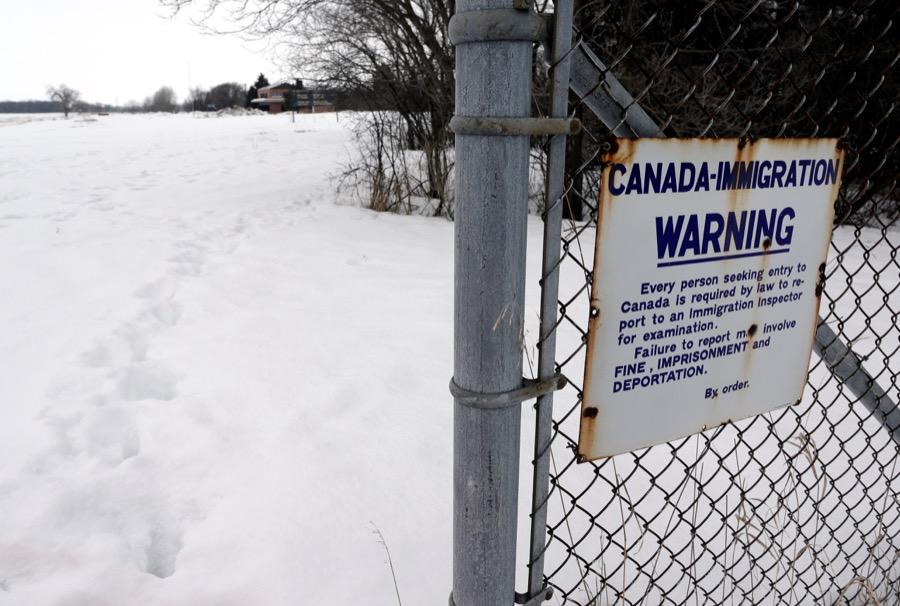More US citizens — yes, citizens — are seeking refuge in Canada
A former border crossing used by refugees walking from the United States to enter Canada at Emerson, Manitoba.
Canada is world famous for welcoming refugees, but one group has had a tough time getting in: US citizens.
A small but increasing number of Americans want refuge in Canada. In fact, the number of them requesting asylum north of the border more than doubled between 2015 and 2016, from 80 to 187, according to Canada Border Services Agency data. Most of them were denied.
Some are trying to avoid going to prison, others refuse to fight in America’s wars. Now, immigration lawyers are predicting more US citizens will attempt to flee for Canada — to escape Donald Trump’s America.
But despite Canada’s open-door reputation for those in need, admitting more than 40,000 Syrian refugees since 2015, its acceptance rate for American asylum-seekers is below 1 percent, according to the Immigration and Refugee Board of Canada.
“I am aware of one [American] adult in 2014 who was accepted as a person in need of protection. All the others were children,” said Melissa Anderson, the spokeswoman for Canada’s refugee tribunal.
Normally, the only American citizens who get refugee status in Canada are the children of undocumented immigrants, including children born in the US to parents living there illegally, she explained.
Their numbers aren’t nearly as big as, say, Syrians or Colombians, who are among the leading nationals seeking asylum in the country. America does not have the same life-threatening dangers. But US citizens have cited several reasons for making refugee claims in Canada.
Trouble with the law
At the end of 2015, Canada’s immigration authorities ordered the deportation of a 25-year-old asylum-seeker from Illinois.
Canadian court documents identify the man as “X.” They say he was wanted in the US for “enticing a minor to engage in sexual activity,” when he was 22 and the girl was 15. He had met the girl online, driven to her house and honked for her to get into his car, at which time the girl’s stepfather intervened. He faced 10 years in US prison.
He told the Canadian refugee tribunal that his only intention was to meet the girl.
Canada rejected his request. A judge said there were “reasonable grounds” and enough evidence provided by US authorities for the panel to consider the man guilty as charged.
But another American escaping sex charges in the US was more successful. In 2014, 47-year-old Denise Harvey, who was facing 30 years in US prison for having sex with a 16-year-old boy, got admitted as a protected person in Canada.
It turns out that 16 is the age of consent in Canada, and the woman wouldn’t have faced criminal charges for her actions had they taken place in in the country.
Then there was Kyle Lydell Canty, an African American who in 2015 was facing charges in the US including jaywalking and disorderly conduct. As CBC News reported, he applied for refugee status in Canada, claiming he was a victim of racism and police brutality. Canada rejected him.
“It’s very unusual” for Canada to grant refugee claims to Americans, said Marshall Garnick, an immigration lawyer in Toronto. It could cause “an international incident for the government of Canada to accept Americans [as refugees]. It’s not good for Canada’s image.”
Opposition to war
In the past decade, a number of US soldiers have requested asylum to avoid being court-martialed for refusing to deploy to Iraq and Afghanistan. For instance, in 2013, the refugee tribunal in Toronto denied the refugee claim of a 27-year-old US soldier who deserted after serving in Afghanistan. In court documents, he stated that he felt that American military presence in Afghanistan “was creating a police state rather than a democracy, sponsored by international big business and resulting in needless civilian and military casualties.”
Canada denied the claims by US Iraq and Afghan war objectors.
One asylum-seeker, Rodney Watson, is a US Army veteran who refused to return for a second tour in Iraq. He has been living in a church in Vancouver for seven years to avoid deportation.
Although the numbers are much lower, these war resisters' motives may be reminiscent of the historic exodus to Canada of tens and thousands of Americans who opposed the Vietnam War, many of whom remained.
More expected under Trump

A rising number of African and Middle Eastern migrants are crossing the US border for refuge in Canada. Trump’s immigration crackdown, and Canada’s openness, are expected to beckon more to follow.
“Virtually every person who’s crossed, from pregnant women in the back of trucks to those shepherding their children to safety, have said to us that the United States is no longer a safe country for them to be in,” Paul Caulford, a doctor at the Canadian Centre for Refugee and Immigrant Healthcare outside Toronto, told the Otherhood podcast in February.
Related: Way more migrants are now sneaking across the US-Canada border
After Trump’s executive order in January to halt the arrival of all refugees and certain Muslim travelers, Canada’s Prime Minister Justin Trudeau said, “Canadians welcome you, regardless of your faith.”
That executive order is suspended after court challenges against it. But the Trump administration is ordering more immigration restrictions and deportations.
Up until now, Canadian refugee lawyers said most of their American clients were largely the children of undocumented immigrants, service members who didn't want to deploy to Iraq and Afghanistan, or spoke out against the US military; people with mental health problems; or fugitives from justice.
A few Americans who were facing the death penalty have also sought safety in Canada, because Canada will not send someone back to face capital punishment, according to its extradition terms with the US, said attorney Peter Edelmann, who has represented Americans who were seeking asylum in Canada.
But with Trump in power, Canada should expect new types of cases, the refugee attorneys said.
“We're going to get a new kind of refugee claim from US citizens in the next four years — they won’t be like the ones in the past,” Garnick said in an email. “It’s not going to be primarily the US army deserters who were dishonorably discharged due to their refusal to be deployed or redeployed to Iraq. It will be a different kind of US citizen refugee claimant.”
For example, Garnick said a Muslim American citizen of Iranian descent might get asylum in Canada if they show they cannot live safely in the US because of the threat of injury or death, or that they can’t get a job due to their religion or ethnic background.
“In other words, if [the Muslim American] could prove that a blanket travel ban like the one Trump brought in is not just causing him to feel uneasy, but actually has caused him a reasonable subjective and objective fear, due to letters of threat or perhaps some other incident,” Garnick said, “he'd have a chance at a refugee hearing.”
Julie Masis reported from Montreal.
